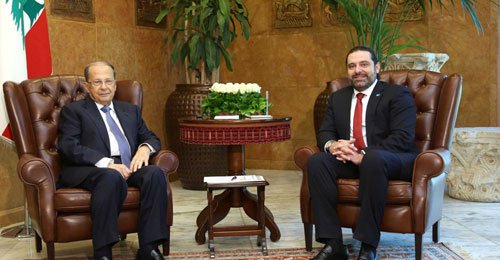 Lebanese President Michel Aoun will not accept PM Saad Hariri’s resignation until he returns to Lebanon to explain his reasons, palace sources said on Sunday, delaying for now the politically difficult consultations over his successor.
Lebanese President Michel Aoun will not accept PM Saad Hariri’s resignation until he returns to Lebanon to explain his reasons, palace sources said on Sunday, delaying for now the politically difficult consultations over his successor.
This comes after Hezbollah chief Hassan Nasrallah said he would not comment on accusations leveled against Hezbollah by Hariri, describing his resignation announcement as a Saudi statement.
Hariri’s resignation toppled a coalition government that included Hezbollah, thrusting Lebanon back into the frontline of the Saudi-Iranian regional rivalry and risking an open-ended political crisis.
The government was formed late last year in a political deal that ended years of deadlock, and last month it produced Lebanon’s first budget since 2005.
Nasrallah said he had thought things were going well and had not wanted Hariri to quit.
“LEGITIMATE CONCERN”
Hariri allies in Lebanon have denied suggestions he had been detained and a photograph was published on his Twitter account showing him with Saudi Arabia’s newly appointed ambassador to Lebanon, Walid al-Yaaqoub.
News of high-level arrests in Saudi Arabia fueled social media speculation in Lebanon that Hariri, a Saudi national, was a target. Nasrallah said “there was legitimate concern”, asking if Hariri had anything to do “with this internal struggle between the princes”.
Saudi Oger, the construction firm owned by the Hariri family, has faced a multibillion-dollar debt restructuring. The company was hit by a decline in oil prices led to sharp state spending cuts in the kingdom.
Saudi-owned newspaper Asharq al-Awsat cited unnamed sources close to Hariri as speculating that he would probably remain outside Lebanon because of the security threat against him.
Central Bank Governor Riad Salameh sought to calm fears the political turmoil would hit Lebanon’s already fragile economy, issuing a statement to reaffirm the stability of its currency, which is pegged against the U.S. dollar.
In Lebanon’s sectarian system the president must be a Maronite Catholic, the prime minister a Sunni and the speaker of parliament a Shi‘ite. Hariri is Lebanon’s most influential Sunni politician.
His father, Rafik al-Hariri, was prime minister after Lebanon’s 1975-1990 civil war and was assassinated in a car bombing in 2005.
A U.N.-backed tribunal has indicted five Hezbollah members for the killing but the group denies any involvement.
Saudi media have published reports of a plot to assassinate Hariri in recent days, but all of Lebanon’s main security branches have said they have no information about such a plot.
A Saudi minister said on Saturday that Hariri’s personal security detail had “confirmed information” about the plot. Thamer al-Sabhan said in an interview with a Lebanese TV station on Saturday that there were “threats against the prime minister and the kingdom is keen for his security”.
U.N. Secretary-General Antonio Guterres was concerned by Hariri’s resignation and hoped all sides in the country would back its state institutions, his spokesman on Lebanon Stephane Dujarric said in an emailed statement.
REUTERS

Leave a Reply
You must be logged in to post a comment.